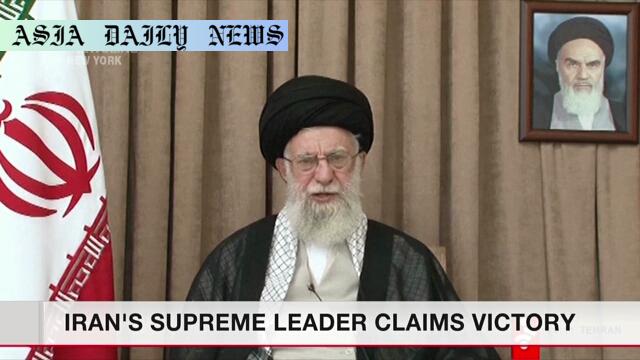Victory: Iran’s supreme leader defends his forces’ achievements, claiming a ‘hand-slap’ dealt to America’s plans.
- Iran’s supreme leader claims triumph after ceasefire.
- Tensions rise as Khamenei denounces US and Israel.
- International Atomic Energy Agency seeks dialogue.

Iran’s Leadership Proclaims Victory in Ceasefire’s Aftermath
In a dramatic address broadcast on state television, Iran’s Supreme Leader Ayatollah Ali Khamenei boldly claimed victory over the United States and Israel following the recent ceasefire between the nations. Khamenei outlined his perspective on the confrontation, asserting that Iran’s forces not only resisted US attacks but also delivered “a hand-slap to America’s face.” He appeared confident, portraying the ceasefire as a significant achievement for Iran in the ongoing regional tension. His statement added fuel to an already fraught atmosphere of disputes, with both Israel and the US offering contrasting narratives regarding the events.
Khamenei’s rhetoric cast doubt on US officials’ portrayal of their military actions. “They failed to do anything significant,” he asserted, targeting the US President’s declarations regarding the extent of damage inflicted on Iranian assets. Khamenei dismissed such claims as exaggerated and aligned with a broader pattern of Western psychological warfare. His speech reinforced Iran’s stance of resilience and rejection of surrender amid continued geopolitical pressure.
Contrasting Views from Israel and International Observers
Israeli Prime Minister Benjamin Netanyahu, meanwhile, positioned his nation as the clear victor of the skirmishes. Speaking the same day, Netanyahu celebrated what he described as a victory that could potentially reshape regional diplomacy. He suggested that this triumph might catalyze a broader expansion of peace agreements between Israel and its neighbors, signaling a forward-looking approach amidst the conflict. This optimism starkly contrasted with Khamenei’s fiery rhetoric, painting a picture of two opposing interpretations of the ceasefire’s results.
The conflict’s physical toll remained a subject of debate among international observers. Rafael Grossi, head of the International Atomic Energy Agency (IAEA), acknowledged the differing assessments of the situation. In a podcast interview, he refrained from providing a conclusive judgment about the damage but admitted that it was ‘considerable.’ Grossi’s insights highlighted the nuances underlying the narratives presented by Iran, Israel, and the US. He also revealed that discussions with Iranian officials regarding the return of inspectors were pending, underscoring the need for continued international engagement and dialogue amidst these tensions.
The Broader Implications and Uncertain Path Ahead
The events following the ceasefire signal a continuation of the complex dynamics shaping Middle Eastern geopolitics. Iran’s rhetoric reflects an unwavering resistance to what it perceives as Western and Israeli dominance, contrasting with Israel’s calls for expanded diplomatic relationships. While Khamenei’s claims of victory might serve as a morale booster for domestic audiences, they could also exacerbate tensions with international counterparts.
Grossi’s remarks emphasize that the situation extends beyond military confrontations. The absence of communication with Iranian officials regarding nuclear inspections raises concerns about transparency and accountability in the region. The potential for miscommunication or misinterpretation among world powers remains high, increasing the risk of turning regional disputes into broader conflicts. Without an effective diplomatic framework, the latest ceasefire may only act as a temporary bandage, rather than a resolution to underlying political and ideological disputes.



Commentary
The Complexity of Claiming Victory in Modern Conflicts
The claims of victory by Iran’s Supreme Leader Ayatollah Ali Khamenei and Israeli Prime Minister Benjamin Netanyahu underscore the subjective nature of modern conflict narratives. Both leaders’ statements seem crafted to bolster national morale and reinforce their respective stances amidst conflicts, yet vastly different interpretations of the same events can breed further discord rather than reconciliation. While Khamenei emphasizes resistance and defiance, Netanyahu’s optimism about expanded peace initiatives suggests a more strategic long-term agenda. This disparity exemplifies the challenges inherent in resolving disputes where self-preservation and geopolitical ambitions dictate narratives.
The Role of International Dialogue and Oversight
Rafael Grossi’s observations as the head of the International Atomic Energy Agency offer a key perspective on the need for neutral oversight in fraught global situations. Grossi’s acknowledgment of considerable damage without taking sides illustrates the importance of evidence-based assessments in informing international opinion. More crucial, however, are his efforts to reestablish dialogue with Iranian officials, a step that could pave the way for de-escalation and rebuild trust among international stakeholders. The silence from Tehran in response to these initiatives highlights the difficulties in bridging communication gaps amid heightened tensions.
Path Forward Requires Bold Diplomacy and Collective Responsibility
Moving forward, the international community must grapple with the dual challenges of maintaining peace and holding nations accountable without alienating key players. Diplomatic channels, coupled with unbiased assessments from organizations like the IAEA, are essential to mitigating risks and fostering cooperation. However, efforts to seek mutual understanding must also overcome entrenched mistrust and the frequent politicization of conflicts. True resolution requires both regional actors and global powers to prioritize long-term stability over short-term political gains, ensuring that disputes like this ceasefire transition into sustainable peace rather than a prelude to further hostilities.